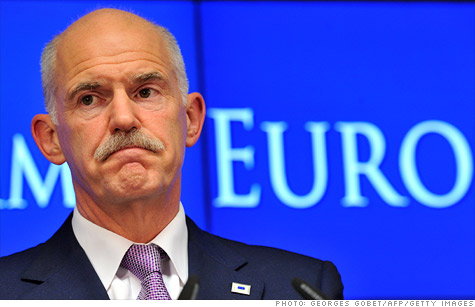
Greek Prime Minister George Papandreou said Thursday that a 109-billion euro aid package will put the nation on a sustainable fiscal path.
NEW YORK (CNNMoney) -- The European Union this week took the boldest step yet to stabilize Greece and contain the threat of a broader debt crisis in the euro zone.
But it remains to be seen if the latest round of debt reduction measures and market backstops will resolve the underlying problems plauging the 17 nation currency union.
"They averted what would have been a meltdown in Europe," said Nariman Behravesh, chief economist at IHS Global Insight. "But there are still some huge challenges ahead."
To be sure, the 109 billion euro aid package for Greece and proposed expansion of the European Financial Stability Fund represent the most significant step the EU has taken to prevent the spread of debt contagion.
The financial markets reacted with sighs of relief, followed by more than a little head-scratching.
At first, investors were heartened by the simple fact that an agreement had been reached. But the size and scope of the rescue effort for Greece was generally larger than expected. The deal involves lowering interest rates and extending maturities on existing bailout loans, as well as more favorable terms for future loans from the EU stability fund.
Markets in Europe rose Friday, but closed below session highs. Shares on Wall Street were mixed as investors digested the news out of Europe and corporate earnings reports in the U.S.
Aside from Greece, the decision to empower the financial stability fund to buy sovereign bonds in the secondary market and provide lines of credit to troubled banks was a hit with many investors.
"What makes these agreements stand out from other deals is that this one has a semblance of being preemptive," said Ashraf Laidi, chief executive of Intermarket Strategy. "As opposed to a reactionary, last-minute deal that aims to prevent bond spreads from soaring."
But key elements of the plan remain unclear, including how the involvement of private sector banks and investors to help lower Greece's debt load will affect the nation's credit rating.
Under the terms of the debt reduction plan, banks and private sector investors will voluntarily choose from a menu of four options to rollover Greek bonds into longer-dated maturities or swap them for higher-rated securities.
The big ratings agencies had warned that any losses by private sector holders of Greek debt, even on a voluntary basis, would be considered a form of default. That raised worries about a potential meltdown in the market similar to the one caused by Lehman Brothers' collapse.
Fitch Ratings was the first to weigh in on the issue, saying it would consider Greece to be in "restricted default" and would put a default rating on Greek bonds once investors took part in the plan.
The agency said it would then assign a new "post-default rating" to Greece and its bonds "once the default event is cured" and the bondholders have been given replacement assets.
"We've gotten some mixed messages from the ratings agencies," said Behravesh. "Now the talk is that Greece will be in some sort of temporary default."
In any event, most analysts agree that Greece needs to restructure its debt load, and the measures announced Thursday are aimed at making that restructuring process orderly.
Still, serious questions remain about how to resolve the threat posed by Ireland and Portugal. Both nations, like Greece, have unsustainable debt loads and anemic economic growth.
As part of the new deal, the EU agreed to provide more favorable terms on future bailout funds for Ireland and Portugal.
That could help keep Ireland and Portugal out of the public debt market until 2013, notes Fitch. After that, however, the nations will have to stand on their own.
If they can't, Fitch warned that it may incorporate the risk of private sector losses on its ratings of Irish and Portuguese bonds, suggesting the possibility of another structured default.
The big challenge, economists say, is how to revive growth in troubled European economies so that debts and deficits can be resolved organically.
Jonathan Loynes, an economist at Capital Economics, said the new measures include "some significant advances" in the policy response to the debt crisis.
"But once the dust settles, the markets will surely return to the question of whether the package really addresses the fundamental economic and fiscal challenges facing both Greece and the euro zone in general," he said. "They will probably conclude that the answer is no." ![]()
| Overnight Avg Rate | Latest | Change | Last Week |
|---|---|---|---|
| 30 yr fixed | 3.80% | 3.88% | |
| 15 yr fixed | 3.20% | 3.23% | |
| 5/1 ARM | 3.84% | 3.88% | |
| 30 yr refi | 3.82% | 3.93% | |
| 15 yr refi | 3.20% | 3.23% |
Today's featured rates: